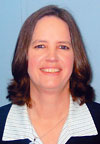Hospital welcomes new chaplain
By Phyllis Moore
Published in News on October 18, 2005 1:46 PM
Suzanne Franklin didn't know what aspect of the ministry she would like to go into when she finished seminary. But after spending two years in pastoral care at Wake Medical Center in Raleigh, she found it to be a perfect fit.
"I enjoy people," she said. "I like to hear their stories."
What especially appeals to Ms. Franklin, the new chaplain at Wayne Memorial Hospital, is that people are more real in a hospital setting. The "mask" comes off, she said, making a person more vulnerable than he or she might ordinarily be.

Suzanne Franklin
"A lot of times they're strong people," she said. "Sometimes, to give permission to cry or to talk about what is going on is hard, especially because they don't want to scare the family members. But because you're not a family member, they have a place, permission to let down their guard. Maybe get some type of support that they don't normally reach out for ... a safe place and knowing that it's going to be held in confidence."
It is an honor she takes seriously, Ms. Franklin said.
"It's connecting with people, and it's allowing that person to touch you as much as you touch them," she said. "To me, you're handling something very precious, and it's very important how you handle that."
She said she will usually ask if a patient wants prayer or how she might specifically pray for his or her needs.
"You have to respect where people are," she said. "We're here to facilitate healing."
In the big picture, the spiritual needs of a person can be tantamount to one's progress as much as any medicine. Studies have shown that attitude and prayer often play a part in one's healing process.
"It's part of healing, and it's important for us not only to meet the patients' physical and medical needs but their emotional needs," said Amy Cain, public relations director for the hospital. "For pastoral care, No. 1, emotional is tied into how they feel spiritually."
"Not that prayer is a magic wand," Ms. Franklin added. "But there's something about naming what's going on in your life, that helps in prayer as well."
Once trust is established and a person becomes more comfortable, she said, her presence takes on a whole different resonance.
"I think the most powerful thing about praying is the fact that if you go in and talk to the patient, you hear their stories, you hear their concerns," she said. "They have had a chance to voice that to someone who represents God."
She said she is especially amazed by the capacity of the human spirit.
"If you connect, something powerful happens," she said. "Not only to them but to you; it energizes me. It makes me feel good to be a part of the human race to see the humanity and compassion."
Not that her day is solely spent visiting with patients. While Ms. Franklin said she enjoys that aspect and finds most people are receptive, her job is also to develop the hospital's pastoral care program.
About 15 area pastors currently volunteer in the program. She said she hopes more will consider the role as a way of expanding their church ministries.
"Ministers are already in place, and we try to build in flexibility based on what they want to do," she said. "Some may take a pager and be available in case of a crisis. It's going to develop over time, but we want to kind of tailor it to their particular ministry and what they have a passion for."
Ms. Franklin said she looks forward to learning from others who have been in the field longer than she. Originally from the Gastonia area, she earned a degree in English from Wingate University and graduated from Southeastern Seminary in Wake Forest in 2003.
"I'm going to try to get a lot of people to come on board to cover the hospital," she said. "There's a lot of different ways we can minister."
Ms. Franklin said she sees herself as a servant, not only to patients but to hospital staff and the community. Different from church pastors in that the hospital's "congregation" keeps changing, she said there are still many opportunities to help others.
"You do have a lot more time than the doctors and nurses," who are often pulled in many directions and have greater time restrictions, she said. "That's one way you can support the hospital staff. I think they feel good when they see a chaplain go in and comfort a patient."
While patients have the right to refuse any ministerial presence, Ms. Franklin said it is still important to make the offer.
"The key is always being open to hearing the patients," she said.
